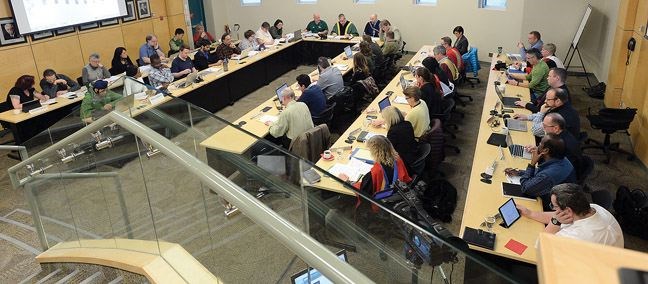The University of Northern B.C.'s senate is officially registering its dissatisfaction with the process of selecting the school's new chancellor, former Conservative MP James Moore.
Following a lengthy discussion on Wednesday afternoon, the group almost unanimously approved a proposal by undergraduate student representative David Clarkson to have UNBC president Daniel Weeks notify the school's board of governors that it didn't sufficiently consult with the senate on Moore's appointment.
The senate governs academic decision-making at the university, compared to the financial decisions handled by the board of governors.
According to the University Act, "there must be a chancellor of each university, who is to be appointed by the board on nomination by the alumni association and after consultation with the senate..."
"I don't consider a 45-minute in-camera discussion, mere weeks before the final decision was made, to be any sort of consultation. We didn't have any time to reflect or asses this choice or any time to review the materials or even do any research on the candidate at all," said undergraduate student representative Wendel Schwab.
"In fact, all that you generally got from this supposed consultation was essentially just the knee-jerk reaction of the senators who were available at the time."
Ever since Moore was announced as UNBC's incoming figurehead on Nov. 26, there has been an outpouring of opposition from both the university and wider community.
An online petition, started by an anonymous member of the senate, now has more than 2,000 signatures calling for the board of governors to reverse its decision in selecting Moore for the job - a choice made after nomination by the school's alumni association.
Board of governors chair Ryan Matheson was invited to Wednesday's senate meeting, said senate vice chair Paul Siakaluk, but was unable to attend.
Moore is scheduled to be sworn in as university chancellor - the sixth in the school's history - in May.
Among the reasons cited by some for their opposition to Moore was what they called a misalignment between his link to the former Conservative government and its treatment of science, research and the arts and a research-dependent institution.
Others, like faculty member Heather Smith said that while Moore's appointment was "counter to everything (she's)... stood for as an academic," her main issue was with the lack transparency about his nomination. All of the public information she's seen indicated that the nomination period was open from the end of December 2014 until the middle of January 2015, Smith said.
Moore announced his resignation from politics in June.
If he was still a sitting member of Parliament when nominated, Smith said she wanted to know why Moore wasn't deemed ineligible for the job.
"Now maybe there's all sorts of reasons for this. But for me, it's the process that doesn't add up," Smith said. "I'm a political scientist, I deal with people that have different values all the time - I can deal with that. What I can't deal with is the lack of transparency around the process."
Weeks said information on the process would be compiled for the senate, once it was vetted to protect privacy concerns.
Ecosystem science and management associate professor Chris Opio brought the assembled group in the senate chamber to applause with his remarks once the meeting was opened up to hear comments from the gallery.
Opio, who has been in Prince George since 1995, said he wanted to be in a place where he's proud of the university and that the infighting and public mudslinging had gone too far.
"I want to leave you with an African proverb that I was taught a long time ago: when two elephants fight, it's the grass that suffers the most," Opio said.
"It's the university and the reputation of the university that will suffer."



